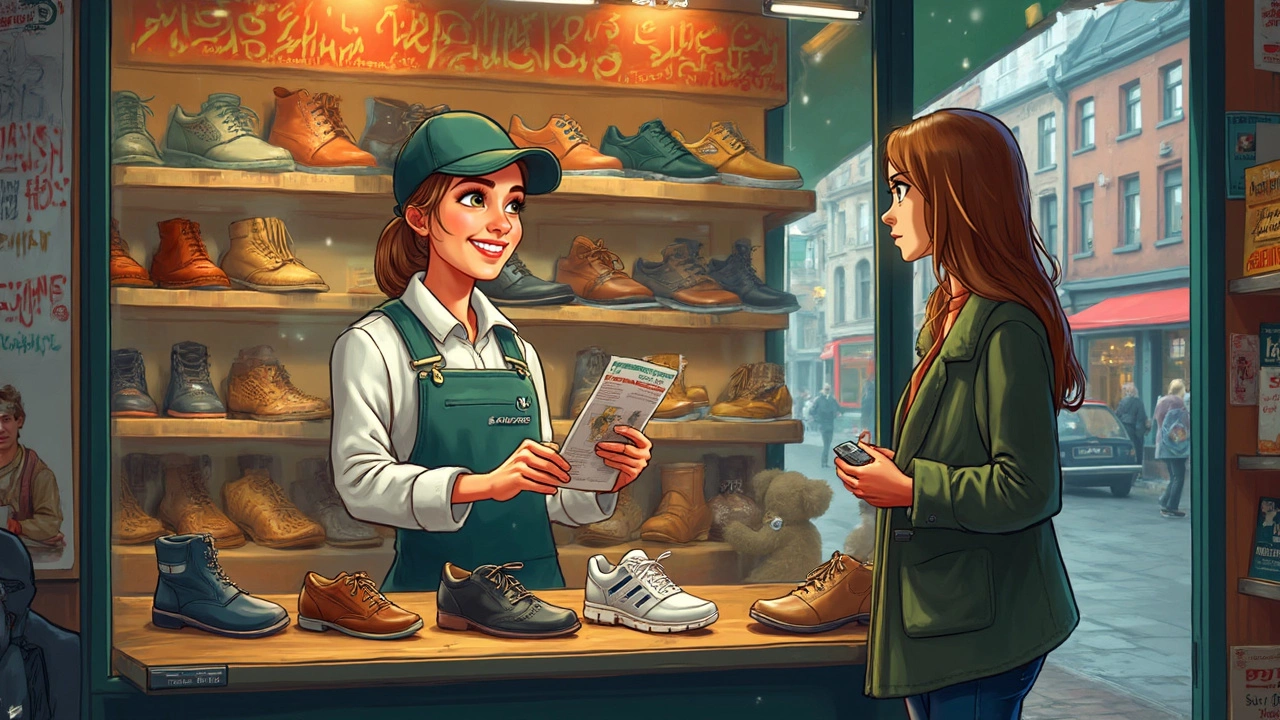If you walk through Penneys in Limerick or shop on Grafton Street, you’ll spot loads of Skechers. They’re everywhere in Ireland, thanks to their cushioned soles and lightweight feel. But, open up a conversation with any experienced podiatrist in Dublin or even a GP in Letterkenny, and you’ll hear a very different take—especially about wearing Skechers as work shoes.
The big problem? Skechers might feel comfy at first, but Irish podiatrists see the same issues again and again. People working long shifts—nurses at Beaumont Hospital, teachers in local secondary schools, or retail staff in Dundrum Town Centre—often show up at clinics with sore heels, aching arches, or knee pain. And a lot of those cases have one thing in common: shoes that simply don’t provide the right support, especially ones with soft, bendy soles like most classic Skechers.
- What Sets Irish Workplaces Apart
- Why Skechers Fall Short for Irish Feet
- What Podiatrists Recommend Instead
- Best Tips for Choosing Work Shoes in Ireland
What Sets Irish Workplaces Apart
When it comes to jobs in Ireland, one thing stands out: people are on their feet a lot. Whether it’s baristas in Galway cafés, retail staff in Cork’s Mahon Point, or nurses covering long shifts at St. James’s Hospital, standing and walking all day is just a normal part of work here. You’ll even see Gardaí in Dublin city centre racking up 15,000 steps before lunchtime.
A 2023 Health and Safety Authority survey found that over 40% of Irish workers spend six or more hours standing at their job every day. That’s more than most other EU countries. And let’s not forget the weather—dodging puddles on O’Connell Street or heading up slick castle paths in Kilkenny isn’t gentle on feet, especially if your shoes aren’t up for it.
It’s not just the hours standing; it’s the surfaces too. You might be working in a modern office with hard floors, at the Aviva Stadium on concrete, or doing rounds on the stone corridors of a historic hospital. All these can take a toll on your feet, especially if your work shoes don’t offer proper support, grip, or protection from the cold and damp.
"The kind of foot problems we see in Ireland are really linked to how much time people spend standing or walking at work—shoes without enough support just lead to more trouble down the line," explains Dr. Aisling Keane, senior podiatrist at the Mater Hospital.
Here are a few features of Irish workplaces that really make the choice of work shoes extra important:
- Long shifts and few breaks for sitting down (think: healthcare, retail, teaching).
- Slippery surfaces and unpredictable weather—rain, sleet, the odd snow shower.
- Hard concrete or tile floors in many public spaces and workplaces.
- Dress codes sometimes make comfort and safety even trickier (like required black work shoes for many hospitality jobs).
| Sector | Average Steps/Shift | Common Floor Type |
|---|---|---|
| Retail (city centre) | 11,500 | Tile/Concrete |
| Healthcare | 13,000 | Stone/Vinyl |
| Hospitality | 10,000 | Wood/Tile |
So, for anyone in the Irish workforce, choosing the right work shoes isn’t just about style—it’s about keeping up with the demands of the job and the Irish weather. Flimsy trainers just won’t cut it for lasting comfort or health, and that’s exactly why podiatrists stress this point.
Why Skechers Fall Short for Irish Feet
There’s no question that Skechers are popular in Ireland. The big issue, though, is that their soft soles just don’t offer the structure most feet need—especially on jobs where you rarely sit down.
Let’s get specific. A lot of Skechers styles are made with ultra-flexible foam soles. While these feel grand for a stroll along the cliffs at Howth, they’re a different story if you’re standing for hours in a pharmacy on a busy Saturday or trekking hospital wards in Cork. Simple fact: shoes without enough arch and heel support make Irish podiatrists nervous. No-fuss support is what keeps feet from flattening out, which helps stop that nagging pain in the arch or heel.
When podiatrists at clinics like Foot Solutions in Dublin take a look at the feet of workers who favour Skechers, common complaints pop up—plantar fasciitis, knee pain, even sore backs. A study in The Journal of Foot & Ankle Research found that people wearing soft, unsupportive shoes (think memory foam trainers) were nearly twice as likely to report foot pain after standing for more than six hours.
Here’s a breakdown of issues citied by Irish foot specialists:
- Poor arch support (especially for people with flat feet or high arches common in the Irish population)
- Too much flexibility—makes your foot work harder and can leave muscles over-tired
- Minimal heel stability, which is bad news on wet city streets or slippery hospital floors
- Soft uppers don’t hold the foot tight enough, leading to excess movement inside the shoe
- Not built for the mix of rainy, sometimes uneven Irish surfaces (hello, slick cobblestones!)
Have a look at this quick comparison table of Skechers versus typical podiatrist-recommended work shoes sold in Ireland:
| Feature | Skechers | Podiatrist-Recommended |
|---|---|---|
| Arch Support | Minimal | Strong |
| Heel Counter | Flexible | Firm |
| Water Resistance | Low | High (often leather) |
| Slip Resistance | Varies | Usually rated/high |
So why does any of this matter in Ireland, specifically? Rain, long commutes by foot, and lots of standing on hard indoor surfaces make small flaws in shoes add up fast. It’s not just about comfort—Skechers may actually make foot problems worse over time, and that means more missed workdays and pricey clinic visits.

What Podiatrists Recommend Instead
Irish podiatrists are clear about one thing: you need sturdy, supportive shoes for work—especially if you’re on the go all day in shops, hospitals, or schools. The fluffy comfort of Skechers just doesn’t hold up for long shifts on hard floors.
Instead, most experts will point you towards shoes with a firmer, less flexible sole and good arch support. Think brands like Clarks, Ecco, or even the good ol’ Dubarry for something more formal. For those working in healthcare, Hoka and Brooks (yes, the running shoe brands) are getting popular in Irish hospitals for their combination of cushioning and stability.
If you have wide feet—a common problem here, especially as you get older—New Balance and Asics also have solid reputations. Supervalu sometimes stocks a basic range, but the bigger selection is usually found in dedicated shoe stores like Greene’s in Cork or the Shoe Suite in Galway.
Here’s what to look for if you want a shoe that’ll keep your feet happy at work:
- Firm heel counter: The back part of the shoe should be stiff, not squishy. Give it a squeeze in the shop—the heel shouldn’t easily collapse.
- Good arch support: Check inside—can you feel a raised area where your arch sits? No arch means your feet work harder, and that leads to soreness by the end of the day.
- Minimal twisting: Hold the shoe at both ends and try to twist it. If it corkscrews easily, it won’t support you enough. You want a bit of resistance.
- Roomy but secure fit: Leave a thumb’s width at the end for your toes, but make sure your heel doesn’t slip out.
Dr. Orla Fahy, a respected podiatrist in Dublin, puts it plainly:
"If you’re working on your feet in Ireland, don’t be seduced by softness alone. Support, structure, and the right fit beat a cushioned feeling any day for long-term foot health."
And it’s not just podiatrist opinion—studies from the Royal College of Podiatry show that proper support can cut down the risk of plantar fasciitis and other common Irish workday complaints by over 60%. That’s a serious difference, especially if you’re constantly clocking up steps at University Hospital Limerick or in busy hospitality spots in Temple Bar.
If in doubt, Irish podiatrists recommend getting fitted in person. Many local shops offer gait analysis for free—Elverys, Intersport, and sometimes even McCauley Health & Beauty in larger towns.
Best Tips for Choosing Work Shoes in Ireland
Picking the right work shoes in Ireland can actually save you from a heap of trouble—blisters, aching knees, dodgy backs, you name it. Whether you’re rushing between wards in St. Vincent’s, teaching kids in Killarney, or pulling pints in Galway, your feet need proper support. Here’s what the seasoned podiatrists around Ireland keep repeating to folks who walk into their clinics:
- Get the Right Support: Go for shoes with solid arch support. Most Skechers rely on soft foam that bottoms out quick, especially with heavy use. Good work shoes hold your foot steady—think thicker midsoles and stiffer soles.
- Check the Fit: Never buy shoes just because your mate said they’re comfy. Irish feet come in all shapes, and part of surviving our rainy climate means picking shoes that don’t pinch, squish, or flop off. Try them on late in the day, when your feet are a bit swollen (typical by the time you finish a shift in SuperValu or Boots).
- Look for Certification: In Ireland, many jobs—especially in HSE hospitals or in catering—require shoes with the EN ISO 20347 safety rating. These are slip-resistant and designed for long hours on tiled, wet floors.
- Go for Breathability: Rainy weather means soggy socks if your shoes don’t breathe. Lighter, mesh-based shoes are grand for summer, but leather (with ventilation holes) usually holds up better in Irish autumn and winter, especially on the way to the LUAS stop.
- Replace Worn Soles: Podiatrists in Cork and Dublin see a stack of injuries from people wearing shoes that should have been replaced a year ago. If the heel or tread is worn flat, bin them—they’re not doing you any favours.
- Try Before You Buy: Irish stores like Elverys, Skechers, and the specialist shop Shu4U in Cork often let you walk around a bit. Take advantage—walk up and down the aisle as if you're on the hospital ward or shop floor. Pay attention to any rubbing or slipping.
Here’s a quick look at features to watch and brands locals often ask about:
| Feature | What To Look For | Popular Brands (Ireland) |
|---|---|---|
| Arch Support | Firm, shaped midsole | Clarks, Ecco, Solidus |
| Slip Resistance | Marked as "SRC" or "SRA" | Oxypas, Skechers Work |
| Certification | EN ISO 20347 | Toffeln, Portwest |
| Durability | Full leather upper, sturdy sole | Dr. Martens, Ecco |
No shoe lasts forever, especially in Irish weather. If you find your feet ache at the end of the day or your work shoes start to look battered, it might be time for a swap. And don’t be shy asking shop staff for advice—they know which shoes get sent back in droves and which ones last the pace in Irish workplaces.
